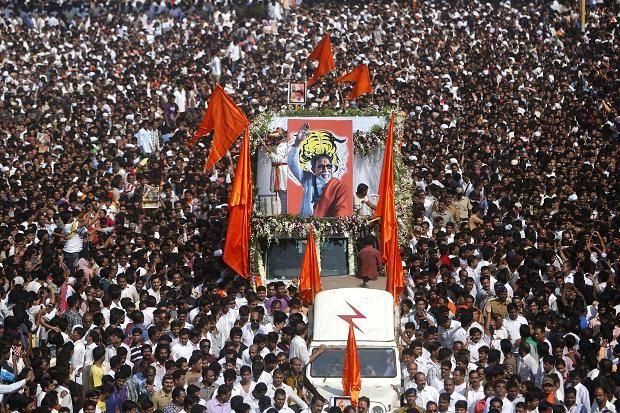Bal Thakeray - Little Known Outside Of India, But A Giant Within

To some, Bal Thakeray was the controversial far-right-wing xenophobe who fanned the flames of ethnic conflict in Maharashtra, India’s second most populous state.
But if the Indian public’s reaction to the death of this long-time politician is any indication, far more Indians -- at least those in Maharashtra -- revere the founder of the Hindu nationalist Shiv Sena (Shiva’s Army) political organization. News of the 86-year-old’s death on Saturday shut down commerce in the streets of Mumbai over the weekend.
His funeral saw a procession on Sunday stretch for a mile between Mumbai’s Kalanagar district to Shivaji Park, where Thakeray’s body was cremated, only the second time in modern Indian history that such a rite took place in public with the government’s approval. The Times of India estimated that about 1 million people turned out in a city of 12 million. The outpouring over Thackeray’s passing has been compared to that of other Indian giants, including the co-founder of the Indian Republic Sardar Vallabhbhai Patel and global icon of passive resistance Mahatma Ghandi.
By Monday, the streets of the country’s financial capital were winding back down to a normal level of urban chaos following the closing of many shops across the city, some at the insistence of Shiv Sena banner-wielding supporters in some districts.
For a former editorial cartoonist, a man who never held public office, Thackeray held formidable sway with his supporters, largely members of Mumbai metropolitan’s urban poor, which he could summon to shut down the streets of the country’s financial capital on a whim. His brand of Hindu nationalism was appealing to many natives of Maharashtra, a state of 112 million people. But the Shiva Sena, which Thackeray founded in 1966, was born as an anti-immigrant organization demanding greater rights for native born Maharashtrians over the growing influx of migrants from other parts of India.
In March 2010, Thackeray (who was never one to mince words and who often invited controversy with them) said Mumbai was turning into a “dharamshala,” a type of Indian religious rest house used by Hindus Jains and Bhuddists -- a reference to what Thackeray considered a threatening influx of non-Hindus into the city. “The only way to stop the influx of migrants is to start a permit system to impose curbs on those coming here,” he added.
It was this kind of rhetoric that got Thakeray banned from politics, even from voting, for six years, until 2006.
“Thackeray played the ‘son of the soil’ card successfully to arouse the feelings of the Marathi community in Maharashtra,” Satish Misra, a political analyst at the Observer Research Foundation in New Delhi, told Bloomberg Businessweek. “He was the uniting factor for the Shiv Sena, and, in his absence, the party’s movement will suffer a serious blow.”
Indeed, even before the death of the Shiva Sena patriarch, a rift had formed among the Hindu nationalists, some defecting to the Maharashtra Navnirman Sena, also known as MNS or Maharashtra Reformation Army, founded by Thakeray’s nephew Raj, who is considered a more radical version of his uncle. Raj has faced charges of inciting sectarian violence toward immigrants. Stopping short of admitting any crimes, Raj has defended his militant stance.
The current head of the Shiv Sena, Bal’s son, Uddhav, a former wildlife photographer, is seen as the obvious heir apparent. But Uddhav lacks the charisma of his father and the bluster of his cousin in the MNS. Some are looking to his Uddhav’s son, Aditya, who currently heads the Shiv Sena’s youth faction.
The question for the future of the Marathi manoos -- the giant Hindu voting faction of India’s densely populated demographic core -- will depend largely on how the Shiva Sena under Uddhav and the MNS under Raj work together against rival political factions, namely the left’s India National Congress Party and center-left Nationalist Congress Party.
“If Raj and Uddhav are driven further apart by their egos and personal ambitions, the Shiv Sena would be the biggest loser, feel analysts,” read an editorial in Monday’s edition of India Today. “It is certain to start a drift of hardliners within the Sena fold to the camp of Raj Thackeray, who is seen by many as the worthy successor to Bal Thackeray's brand of politics. Any split in Marathi manoos votes would strengthen hands of the rivals, Congress and NCP.”
© Copyright IBTimes 2024. All rights reserved.






















